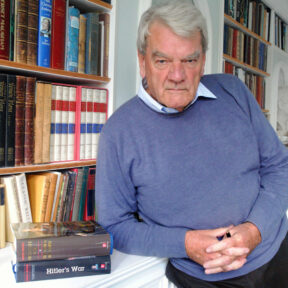
David Irving
: Photo from Wikimedia Commons / Author of Photo: Allan warrenOverview
* Historian who appeals to neo-Nazis and hate groups
* Anti-Semite and Holocaust denier
David Irving is one of the world’s most infamous and controversial anti-Semites and deniers of the Holocaust. He has had long-standing associations with neo-Nazi groups like the National Alliance in the United States, Deutsche Volksunion in Germany, and the Hungarian Justice and Life Party (MIÉP). Irving achieved international prestige as a historian in the late 1960s. Since the 1980s, however, a series of scandals, legal trials, and imprisonment for Holocaust denial have eroded his standing and the considerable income he derived from his work. Moreover, Irving has been barred from entering Germany, Canada, Austria and Australia. Throughout much of the first decade of the 21st century, Irving could no longer find reputable publishers for his work and was forced to self-publish. To promote his work, he traveled extensively throughout America, giving readings and selling books to small gatherings of hate groups.
Irving was born in Essex, England in 1938. In 1957 he entered the physics program at Imperial College, London. He wrote for the student newspaper Phoenix and edited the London University Carnival Committee’s journal, Carnival Times, in which he published racist cartoons, a defense of South African apartheid and Nazi Germany, and the allegation that “the national press is owned by Jews.” He dropped out of college after two years, by which time he had established a reputation as a fascist and anti-Semite. He commented in the British tabloid The Daily Mail that “I belong to no political party. But you can call me a mild fascist if you like. I have just come back from Madrid… I returned through Germany and visited Hitler’s eyrie at Berchtesgaden. I regard it as a shrine.”
In 1963, Irving published The Destruction of Dresden in which he claimed that at least 135,000 civilians had been killed by the Allies’ firebombing campaign. The inflated figures which Irving used to allege Allied atrocities contrasted to the contentions of most scholars that there were at most 25,000 fatalities in Dresden. In his bestselling work, Hitler’s War, published in 1977, Irving sought to present history “through Hitler’s eyes,” claiming that although Hitler was a “powerful and relentless military commander,” he was also a “lax and indecisive political leader.” Hitler’s War ultimately laid the basis for Irving’s lifelong claim that Hitler knew nothing of the Holocaust.
It was during the 1980s that Irving’s gradual journey toward Holocaust denial became complete. Until 1988, Irving had admitted historical evidence for the Holocaust, although he routinely minimized and diminished it. In 1988, however, when he read Fred Leuchter’s supposedly “scientific” document, later termed the Leuchter Report, that claimed there was no iron-based cyanide compound in the gas chambers of Auschwitz, he began fiercely to champion Holocaust denial. Not only did he revise his earlier books to exclude any mention of the Holocaust, but he soon began to give incendiary speeches around the world, calling the camps of Auschwitz a myth:
“I don’t see any reason to be tasteful about Auschwitz. It’s baloney. It’s a legend. Once we admit the fact that it was a brutal slave labor camp and large numbers of people did die, as large numbers of innocent people died elsewhere in the war, why believe the rest of the baloney? […] I say quite tastelessly, in fact, that more women died on the back seat of Edward Kennedy’s car at Chappaquiddick than ever died in a gas chamber in Auschwitz.”
By 1991, Macmillan UK Ltd stopped publishing Irving’s books, and in 1996 St. Martin’s Press canceled his forthcoming biography of Joseph Goebbels. From that point onward, Irving had to self-publish through Focal Point Publications.
In 1993, Dr. Deborah Lipstadt wrote Denying the Holocaust: The Growing Assault on Truth and Memory in which she critically examined and dismissed David Irving’s claims about the Holocaust. Three years later, in 1996, Irving sued Lipstadt and her publisher, Penguin Books, for defamation. On April 11, 2000, Judge Charles Gray ruled for the defense, finding that Irving had “for his own ideological reasons persistently and deliberately misrepresented and manipulated historical evidence” to depict Hitler “in an unwarrantedly favourable light.” Gray also found that Irving was an “active Holocaust denier; that he is anti-Semitic and racist, and that he associates with right-wing extremists who promote neo-Nazism.”
Irving’s lawsuit against Lipstadt and Penguin resulted in his own bankruptcy. Since he was ordered to pay all costs incurred by the defense, Irving had to compensate Penguin two million pounds, approximately $4 million. His failure to pay any part of that amount led to the seizure of his assets, including his London home.
In 2005, upon entering Austria, Irving was arrested for denying Nazi atrocities in speeches he had given there in 1989. During the trial, he attempted to take back his previous statements: “I made a mistake by saying there were no gas chambers … I am absolutely without doubt that the Holocaust took place.” In February 2006, an Australian jury convicted him, and he was sentenced to a 3-year prison term of which he served 13 months.
Since his imprisonment, Irving continually equivocates in interviews about whether he is in fact a Holocaust denier. In an interview in 2008, he declared that he is not a Holocaust denier and immediately followed with an explanation that “the term ‘holocaust’ is odious; it’s American commercialism at its worst.” He has continued to excuse Hitler from culpability for the mass murder of Jews, and to argue against the notion that there was ever a “systemic killing of Jews” by the Nazis. He contends that lower-ranking “evil men” were keeping Hitler “out of the loop” in terms of whatever may have been happening to Jews, and that Hitler “was probably not at all anti-Semitic by the time the war [WWII] began.”